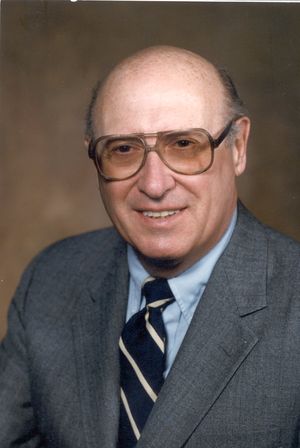Robert A. Frosch: Difference between revisions
No edit summary |
m (Text replace - "[[Category:Culture and society" to "[[Category:Engineering and society") |
||
| Line 17: | Line 17: | ||
<p>Dr. Frosch was awarded the [[2001 IEEE Honors Ceremony|2001 IEEE Founders Medal]] "For a career of significant advances in aerospace and automotive technology, and industrial ecology, and for skilled administration of R&D in industry, government, and academia." </p> | <p>Dr. Frosch was awarded the [[2001 IEEE Honors Ceremony|2001 IEEE Founders Medal]] "For a career of significant advances in aerospace and automotive technology, and industrial ecology, and for skilled administration of R&D in industry, government, and academia." </p> | ||
[[Category: | [[Category:Engineering and society|Frosch]] [[Category:Defense & security|Frosch]] | ||
Revision as of 16:45, 22 July 2014
Biography
Robert A. Frosch's career has included important success in the public, private, and academic arenas. He has skillfully led a wide array of research and development projects, including some with implications for the environment, space travel, defense, and education.
In 1982, Dr. Frosch became Vice President of the General Motors Corporation (GM) in charge of Research Laboratories. There, he championed a five-year program to develop an entirely new approach to engineering electronic and electrical features of vehicles. This research led to the development of the Systems Engineering Center, and significant changes in the way GM designs and develops vehicles. Earlier, as Administrator of NASA from 1977 to 1981, Dr. Frosch played a key role in the development of the very successful Space Shuttle Program.
Robert A. Frosch was born on 22 May 1928, in the Bronx, New York. He earned a B.A. from Columbia College in 1947, and a Ph. D. in Physics from Columbia University in 1952. Four years later he was named Director of Hudson Laboratories at Columbia.
In 1963, he was appointed Director for Nuclear Test Detection in the Defense Department's Advanced Research Projects Agency, where he expanded the seismic research program and two years later became Deputy Director. In 1966, Dr. Frosch was appointed Assistant Secretary of the Navy for Research and Development.
In 1973, Dr. Frosch became the first Assistant Executive Director for the UN Environment Programme, and in 1975, he became Associate Director for Applied Oceanography at the Woods Hole Oceanographic Institution. Since his retirement from GM in 1993, Dr. Frosch has been a Senior Research Fellow at the John F. Kennedy School of Government at Harvard University.
Dr. Frosch is a Fellow of the IEEE and a member of the U.S. National Academy of Engineering, the American Academy of Arts and Sciences, Phi Beta Kappa, and Sigma Xi. He is also a Foreign Member of the Royal Academy of Engineering (UK). His numerous awards include the Navy Distinguished Public Service Award and the NASA Distinguished Service Medal. He has also received Honorary Doctorates of Engineering from the University of Miami and Michigan Technological University.
Dr. Frosch was awarded the 2001 IEEE Founders Medal "For a career of significant advances in aerospace and automotive technology, and industrial ecology, and for skilled administration of R&D in industry, government, and academia."
